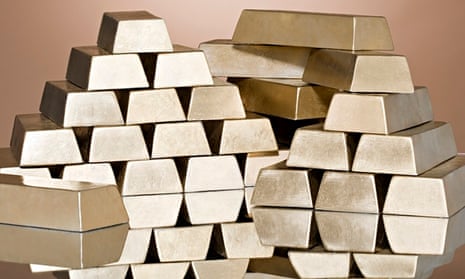The Swiss like referendums: there were 11 last year and there have been nine more this year, on subjects ranging from who pays for abortions to whether the state should buy a certain type of new fighter aircraft.
This Sunday there are three more, but one has attracted more attention than most – because there are fears that if it wins majority support it could trigger a worldwide gold rush.
Five million Swiss voters are to decide on a proposal that would force the central bank to triple its gold reserves. The vote is being watched closely by financial markets and governments around the world.
Under the “Save Our Swiss Gold” initiative the Swiss National Bank (SNB) would be obliged to hold at least a fifth of its assets in gold within five years. The bank would be required to repatriate all Swiss gold held abroad and be banned from selling any of its holdings in future.
A fifth of Switzerland’s 1,040 tonnes of gold reserves are held with The Bank of England and nearly a third with the Canadian Central Bank.
The organisers say they are motivated by wanting “security and independence for Switzerland in times of uncertainty”. They argue a policy change is necessary because attempts to constrain the strength of the Swiss franc to boost national exports have meant the SNB has too many euros at a time when that currency is losing value.
The slogan for the initiative – which has gripped Switzerland and been displayed on posters showing hands holding a grinning piggy bank decorated with the Swiss flag – urges voters to “protect the people’s wealth” by voting yes.
Its supporters come from the populist right-wing Swiss People’s party (SVP), which says in its mission statement: “Most Swiss don’t even know that part of the nation’s gold is stored abroad and that the SNB has already sold over half of the gold reserves.”
Switzerland, a country with a strong tradition of refining and trading gold, has the highest gold reserves per inhabitant of any country, equivalent to four ounces a head. For many this remains insufficient.
If the Swiss vote yes on Monday, the SNB would be required to buy 1,500 tonnes of gold over the next five years, the equivalent of almost 70% of the global gold mined every year. Experts say the gold price would soar. “It would be an unforgettable day for the precious metal industry,” according to German business analyst Michael Schröder.
Ahead of the vote the Swiss franc has risen to a two-year high. But support in the referendum has been waning as it draws nearer, with a poll a week ago suggesting only 38% were in favour, down from 42% last month.
The debate has underlined the emotional and arguably romantic pull of the precious metal in an age where less tangible assets dominate.
“Gold continues to trigger impetuous and irrational reactions in many people,” Sergio Rossi, professor of macroeconomics and monetary economics at Fribourg University, told the Swiss news agency SDA.
Others say it has rather emphasised the flaws in the monetary system. “It has shown just how unsustainable the debt-based monetary system we have is,” said Koos Jansen, an Amsterdam-based gold analyst for the Singaporean precious-metal dealer BullionStar.
“The Swiss initiative is merely part of a increasing global scramble towards gold and away from the endless printing of money. Huge movements of gold are going on right now. Recently the Dutch repatriated 122 tons, Germany is bringing home its gold from the US, whilst the Bric countries are accumulating large quantities of it for their banks.
“While those behind the Swiss initiative have often been portrayed as crazy, they’re merely acting out of fear that their central bank is losing control of its monetary policy, and of the Swiss franc being sucked into this currency war and losing its value,” he said.
Switzerland left the gold standard only in 1999, the last country in the world to do so. “They regret what they did and want to get back to the safety of gold, especially in the current environment,” Jansen added.
The SNB chairman, Thomas Jordan, has warned of “dangerous” consequences if the vote goes through, arguing that if the bank were forced to boost its gold reserves, its costs would increase exponentially and its ability to move within the currency market would be severely hindered, putting its credibility at stake.
“The initiative is dangerous because it would weaken the SNB,” he told an audience near Zurich last week. “The connection between a minimum share and a ban on selling which it embraces would very severely impair our monetary policy room for manoeuvre.”
He added that the initiative was in danger of destabilising one of the SNB’s main policies of not letting the euro weaken below 1.20 Swiss francs, which was introduced in an attempt to protect exporters as the Swiss currency gained strength against the troubled euro.
Opponents of the initiative argue the bank would no longer be able to sell gold in the event of a crisis and so its gold reserves would no longer be considered a reserve in the traditional sense.
But others say if Switzerland were to hold 20% of its assets in gold it would be better protected from the volatility of the currency markets. “The central bank would lose flexibility but long term it would bring the country more stability,” said Jansen.
Sunday’s votes have also called into question Switzerland’s status as one of the most business-friendly countries in the world. The other two proposals to be voted on have sent jitters through the corporate world.
The most controversial, initiated by a leftist-Green group called Ecopop, would restrict immigration to 0.2% of the resident population.
A further proposal would abolish the flat tax system which benefits rich foreigners who choose to live in Switzerland.

Comments (…)
Sign in or create your Guardian account to join the discussion